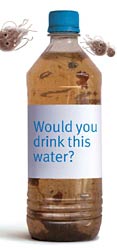Would You Drink This Water? downloadable PDF
Would you drink this water?
 Access to water is a basic human need and a fundamental human right. Yet over a billion people in the world still live without safe, clean water to drink. The diseases that result from drinking dirty water kill 5000 children every single day!!
Access to water is a basic human need and a fundamental human right. Yet over a billion people in the world still live without safe, clean water to drink. The diseases that result from drinking dirty water kill 5000 children every single day!!
While the statistics alone are shocking, they still say nothing about the daily reality of life without clean water. Every day millions of women and children, particularly girls, walk miles to collect water for their families.
The time people spend collecting water or suffering from water-related diseases undermines productivity and economic growth: children miss out on school and women are unable to carry out other work.
The tragedy is that the water women work so hard to collect doesn't come from a tap - but instead comes from a river, pond, or simply from dug out holes in the ground, often shared with animals and polluted with waste and excrement.
"The water is not good from this pond," explains Zenebech from Chobare Meno in
Drinking this water is a choice that no-one should have to make, but one that Stella from the
Despite the clear need, water and sanitation are not high on the political agenda. They are almost so obvious that they are forgotten. The United Nations Human Development Report 2006 Beyond scarcity: Power, poverty and the global water crisis states that few countries treat water and sanitation as a political priority and the international community has failed to prioritize the issue.
Meanwhile the people suffering the most from the water and sanitation crisis - poor people in general and poor women in particular - often lack the political voice needed to assert their claims to water.
FAWCO’s Target Water Program is working to raise awareness about the tremendous problems that result from a lack of access to safe water. There is much information already available on the FAWCO website about water problems and we will continue to inform members on this globally important topic.
The need is great and much must be done around the world to stop the ongoing water crisis. We hope you will join us and help the poorest people escape the stranglehold of disease and poverty caused by the lack of safe water and sanitation.
